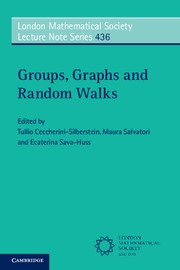Book contents
- Frontmatter
- Contents
- Preface
- Conference Photographs
- 1 Growth of Groups and Wreath Products
- 2 Random Walks on Some Countable Groups
- 3 The Cost of Distinguishing Graphs
- 4 A Construction of the Measurable Poisson Boundary: From Discrete to Continuous Groups
- 5 Structure Trees, Networks and Almost Invariant Sets
- 6 Amenability of Trees
- 7 Group-Walk Random Graphs
- 8 Ends of Branching Random Walks on Planar Hyperbolic Cayley Graphs
- 9 Amenability and Ergodic Properties of Topological Groups: From Bogolyubov Onwards
- 10 Schreier Graphs of Grigorchuk's Group and a Subshift Associated to a Nonprimitive Substitution
- 11 Thompson's Group F is Not Liouville
- 12 A Proof of the Subadditive Ergodic Theorem
- 13 Boundaries of Zn-Free Groups
- 14 Buildings, Groups of Lie Type and Random Walks
- 15 On Some Random Walks Driven by Spread-Out Measures
- 16 Topics on Mathematical Crystallography
Preface
Published online by Cambridge University Press: 20 July 2017
- Frontmatter
- Contents
- Preface
- Conference Photographs
- 1 Growth of Groups and Wreath Products
- 2 Random Walks on Some Countable Groups
- 3 The Cost of Distinguishing Graphs
- 4 A Construction of the Measurable Poisson Boundary: From Discrete to Continuous Groups
- 5 Structure Trees, Networks and Almost Invariant Sets
- 6 Amenability of Trees
- 7 Group-Walk Random Graphs
- 8 Ends of Branching Random Walks on Planar Hyperbolic Cayley Graphs
- 9 Amenability and Ergodic Properties of Topological Groups: From Bogolyubov Onwards
- 10 Schreier Graphs of Grigorchuk's Group and a Subshift Associated to a Nonprimitive Substitution
- 11 Thompson's Group F is Not Liouville
- 12 A Proof of the Subadditive Ergodic Theorem
- 13 Boundaries of Zn-Free Groups
- 14 Buildings, Groups of Lie Type and Random Walks
- 15 On Some Random Walks Driven by Spread-Out Measures
- 16 Topics on Mathematical Crystallography
Summary
The current volume brings together several contributions from the invited speakers and guests of the workshop ‘Groups, Graphs and Random Walks’ held in Cortona (Italy) on June 2 to 6, 2014, on the occasion of the sixtieth anniversary of Wolfgang Woess.
Wolfgang was born in Vienna on July 23, 1954, to Friedrich and Elisabeth Woess, both professors at the University of Vienna. His father was also a gifted painter: when visiting Wolfgang, one immediately gets attracted to Friedrich Woess's beautiful watercolor landscapes adorning the walls of his office at the university as well as of his cosy home.
Wolfgang studied mathematics at the Technical University of Vienna, where he obtained his diploma, at the University of Munich, and at the University of Salzburg, where he obtained his PhD under the supervision of Peter Gerl. After a period as an assistant professor at the Montanuniversität Leoben (1984–1989)—including a leave of absence at the University of Rome ‘La Sapienza’ (1984–1985), where he started a long and fruitful collaboration with the Italian Harmonic Analysis group led by Alessandro Fig`a-Talamanca—and eleven years as a professor at the University of Milan (1988–1999), he eventually became Professor at the Graz University of Technology in 1999, where he currently serves as the chair of the Institute of Discrete Mathematics.
Wolfgang has been and still is, for many of us, a great teacher, a colleague, and a dear friend. As a teacher, he had thirteen PhD students (essentially from the University of Milan and the Graz University of Technology) and several postdoctoral fellows who have obtained important recognition both at the scientific and the academic levels.
His publications (nearly a hundred) range among various mathematical subjects, including convolution powers of probability measures on groups and asymptotics of random walk transition probabilities (at the very beginning of Wolfgang's research); recurrence, spectral radius and amenability, and spectral computations; boundary theory and harmonic functions; infinite electrical networks; context-free languages and their relations with groups and random walks; infinite graphs and groups; random walks on affine groups, buildings, horocyclic products, and lamplighter groups; finally and more recently, reflected random walks and stochastic dynamical systems; Brownian motion on strip (‘quantum’) complexes, treebolic spaces and SOL Geometry, and Markov processes on ultra-metric spaces.
- Type
- Chapter
- Information
- Groups, Graphs and Random Walks , pp. vii - xivPublisher: Cambridge University PressPrint publication year: 2017



